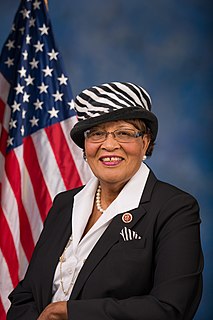A Quote by Aberjhani
The Civil Rights Act of 1964 laid the foundation for the Voting Rights Act of 1965, but it also addressed nearly every other aspect of daily life in a would-be free democratic society.
Related Quotes
The Democrats co-opted the credit for the Civil Rights Act of 1964. But if you go back and look at the history, a larger percentage of Republicans voted for that than did Democrats. But a Democrat president signed it, so they co-opted credit for having passed the Civil Rights Act of 1964 and the Voting Rights Act of 1965.
Contrary to the claims of the supporters of the Civil Rights Act of 1964 and the sponsors of H.Res. 676, the Civil Rights Act of 1964 did not improve race relations or enhance freedom. Instead, the forced integration dictated by the Civil Rights Act of 1964 increased racial tensions while diminishing individual liberty.
[Before the Civil Rights Act of 1964], many governments in southern states forced people to segregate by race. Civil rights advocates fought to repeal these state laws, but failed. So they appealed to the federal government, which responded with the Civil Rights Act of 1964. But this federal law didn't simply repeal state laws compelling segregation. It also prohibited voluntary segregation. What had been mandatory became forbidden. Neither before nor after the Civil Rights Act were people free to make their own decisions about who they associated with.
We passed the Voting Rights Act of Virginia, which restores and builds on key provisions of the 1965 federal Voting Rights Act that was gutted by the United States Supreme Court. Voting is fundamental to our democracy, and this legislation is a model for how states can ensure the integrity of elections and protect the sacred right to vote.
The Civil Rights Act of 1964 was the most sweeping civil rights legislation of its day, and included women's rights as part of its reforms. Ironically, the section on women's rights was added by a senator from Virginia who opposed the whole thing and was said to be sure that if he stuck something about womens' rights into it, it would never pass. The bill passed anyway, though, much to the chagrin of a certain wiener from Virginia.
Liberals say this over and over and over again to hide the actual history, which is why I go through the specifics on the big segregationists in the United States Senate, the ones who signed the Southern Manifesto and the ones who voted against the 1964 Civil Rights Act. There's a panoply of issues to consider. The first time they objected to the Federal government doing something was when it came to civil rights legislation. This is in stark contrast to the very few Republicans who voted against the '64 Civil Rights Act.
I believe we should work to end all racism in American society and staunchly defend the inherent rights of every person. I have clearly stated in prior interviews that I abhor racial discrimination and would have worked to end segregation. Even though this matter was settled when I was 2, and no serious people are seeking to revisit it except to score cheap political points, I unequivocally state that I will not support any efforts to repeal the Civil Rights Act of 1964.
In the South, prior to the Civil Rights movement and the 1964 Civil Rights Act, democracy was the rule. The majority of people were white, and the white majority had little or no respect for any rights which the black minority had relative to property, or even to their own lives. The majority - the mob and occasionally the lynch mob - ruled.






































